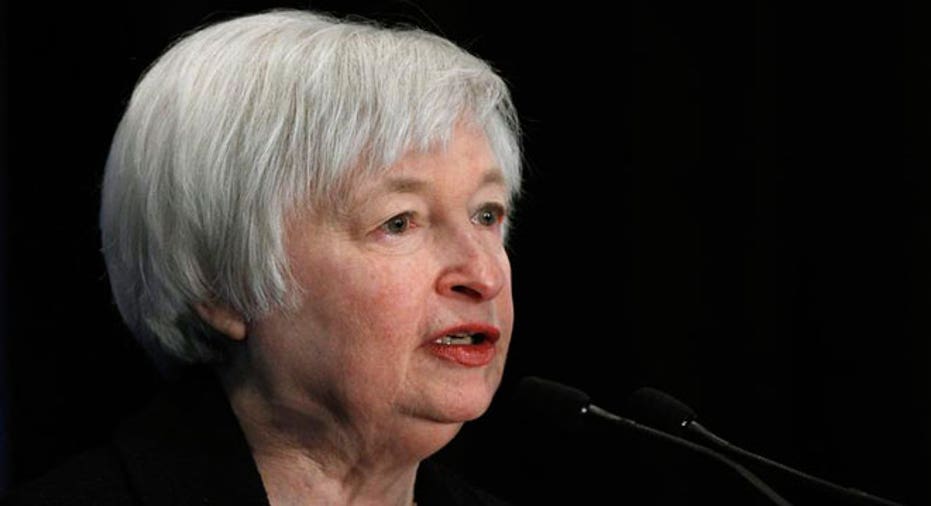Yellen Defends Fed Transparency, Independence Before Congress

Federal Reserve Chair Janet Yellen on Wednesday said the central bank remains on track to start raising interest rates later this year and strongly defended the Fed’s transparency and independent role in setting monetary policy.
Kicking off Yellen’s semi-annual testimony on monetary policy before Congress, House of Representatives Financial Services Committee Chairman Jeb Hensarling (R-Texas) was sharply critical of what he described as a lack of communication between the Fed and Congress.
“The Fed is not above the law,” Hensarling said when inquiring why the central bank has not yet released documents related to an alleged leak from a 2012 policy meeting, and alleging the Fed willingly ignored the Congressional subpoena.
The Fed chair responded by saying the documents in question were in relation to an open investigation by the central bank's inspector general and the Department of Justice, but that they are willing to cooperate, and release the documents, at the conclusion of that probe.
Other Republicans on the committee suggested that a perceived lack of transparency by the Fed warrants reforms to increase accountability.
Yellen, clearly anticipating this line of criticism, countered in prepared remarks that the Fed is more transparent than ever. The Fed chair offered a laundry list of ways in which the Fed releases information to the public and to Congress and repeated her assertion that the central bank needs no more oversight by Congress.
“Transparency concerning the Federal Reserve's conduct of monetary policy is desirable because better public understanding enhances the effectiveness of policy,” Yellen said in prepared remarks.
“More important, however, is that transparent communications reflect the Federal Reserve's commitment to accountability within our democratic system of government. Our various communications tools are important means of implementing monetary policy and have many technical elements,” she added.
Yet she cautioned that too much oversight by Congress could jeopardize the Fed’s independence.
“Efforts to further increase transparency, no matter how well intentioned, must avoid unintended consequences that could undermine the Federal Reserve's ability to make policy in the long-run best interest of American families and businesses,” she said.
Yellen has said in past appearances before Congress that additional oversight by Congress would compromise the Fed’s independence and eventually politicize monetary policy.
Elsewhere, Yellen hewed to the Fed’s long-stated ambition of raising interest rates before the end of the year.
“If the economy evolves as we expect, economic conditions likely would make it appropriate at some point this year to raise the federal funds target rate,” Yellen said in her remarks.
Market jitters raised by recent economic turmoil in Greece and China were mentioned, but neither situation is apparently enough to force a rate hike delay into 2016, as some global entities such as the International Monetary Fund have urged.
Republicans have been especially critical of the Fed in recent years, beginning with the Fed’s unprecedented interventions during the 2008 financial crisis, many of which Republicans strongly opposed.
Specifically and most recently, Republicans are seeking information on an alleged leak at the Fed of information to an economic consulting company in 2012. Yellen has said the Fed has not released information to Congress because the Justice Department is also investigating the incident.
In a sharp exchange with Wisconsin Congressman Sean Duffy, a Republican, Yellen said the Fed will respond to a Congressional subpoena regarding the alleged leak once the DOJ assures the Fed that release of the information won’t compromise the ongoing investigation.
Duffy remained unconvinced.
Yellen didn’t stray far Wednesday from the message conveyed in all her recent appearances. She repeat that if economic conditions continue to improve as the Fed expects, the Fed remains on track to raise short term interest rates later this year for the first time since the financial crisis.
Referring primarily to Greece and China, Yellen said the Fed is monitoring “uncertainties in the global outlook.”
“The situation in Greece remains difficult,” she said, while China is grappling with high debt, weak property markets and volatile financial conditions.
Meanwhile, she portrayed a fairly rosey outlook for the U.S. economy, saying the Fed expects GDP to “strengthen” for remainder of year and that the unemployment rate should decline “gradually” this year.
Inflation, she said, will move “gradually” back to the central bank’s 2% target as “transitory factors” ease.
In addition, the Fed expects high dollar, low oil impact on the economy to “diminish” and that cheap oil prices and job gains should bolster consumer spending. Measures of job market health are “trending in the right direction,” she said.
However, “there is still some slack in labor markets.”
As all of these factors are being measured, the Fed will consider first rate increase on “meeting-by-meeting” basis.



















